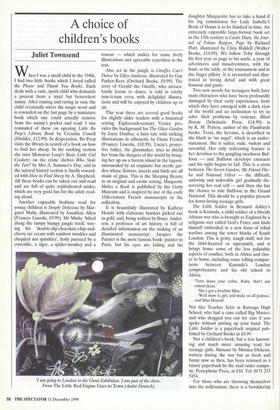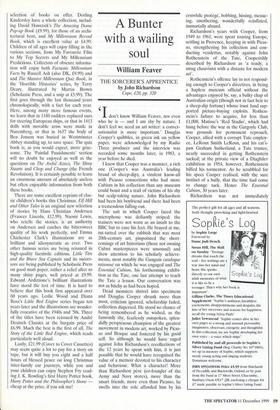A choice of children's books
Juliet Townsend
When I was a small child in the 1940s, I had two little books which I loved called the Please and Thank You Books. Each deals with a rude, spoilt child who demands a present from a strict but benevolent nanny. After ranting and raving in vain, the child eventually utters the magic word and is rewarded on the last page by a miniature book which one could actually remove from the nanny's pocket and read. I was reminded of these on opening Little Bo Peep's Library Book by Cressida Cowell (Hodder, £12.99). In desperation, Bo Peep visits the library in search of a book on how to find her sheep. In the cooking section she tries Monsieur Loup's Basic Little Girl Cookery; on the crime shelves Who Stole the Tart? by Mrs A. Summer's Day; and in the natural history section is finally reward- ed with How to Find Sheep by A. Shepherd. All these books can be taken out and read and are full of quite sophisticated asides, which are very good fun for the adult read- ing aloud.
Another enjoyable bedtime read for young children is Simply Delicious by Mar- garet Mahy, illustrated by Jonathan Allen (Frances Lincoln, £9.99). Mr Minky 'biked along the lumpy bumpy jungle track' wav- ing his 'double-dip-chocolate-chip-and- cherry ice cream with rainbow twinkles and chopped nut sprinkles', hotly pursued by a crocodile, a tiger, a spider-monkey and a toucan — which makes for some lively illustrations and agreeable repetition in the text.
Also set in the jungle is Giraffes Can't Dance by Giles Andreae, illustrated by Guy Parker-Rees (Orchard Books, £9.99). The story of Gerald the Giraffe, who miracu- lously learns to dance, is told in catchy tum-ti-tum verse with delightful illustra- tions and will be enjoyed by children up to six.
This year there are several good books for slightly older readers with a historical setting. Eighteenth-century Venice pro- vides the background for The Glass Garden by Joyce Dunbar, a fairy tale with striking illustrations in silhouette by Fiona French (Frances Lincoln, £10.99), Lucia's protec- tive father, the glassmaker, tries to shield her from the dangers of the world by bring- ing her up on a barren island in the lagoon, surrounded by an exquisite but sterile gar- den whose flowers, insects and birds are all made of glass. This is the Sleeping Beauty in an original and exotic setting. Marguerite Makes a Book is published by the Getty Museum and is inspired by one of the early 15th-century French manuscripts in the collection.
It is beautifully illustrated by Kathryn Hewitt with elaborate borders picked out in gold, and, being written by Bruce Ander- son, a professor of art history, is full of detailed information on the making of an illuminated manuscript. Jacques the Painter is the most famous book- painter in Paris, but his eyes are failing and his 'I am going to London to the Great Exhibition. I am part of the show.' From The Little Red Engine Goes to Town (Andre Deutsch). daughter Marguerite has to take a hand if his big commission for Lady Isabelle's Book of Hours is to be finished in time. An extremely enjoyable large-format book set in the 13th century is Castle Diary, the Jour- nal of Tobias Burgess, Page by Richard Platt, illustrated by Chris Riddell (Walker Books, £14.99). We follow Toby through his first year as page to his uncle, a year of adventures and misadventures, with the hunt, at the table, at the tournament and in the finger pillory. It is recounted and illus- trated in loving detail and with great humour and gusto.
Two new novels for teenagers both have main characters who have been profoundly damaged by their early experiences, from which they have emerged with a dark view of the world and an inclination to try to solve their problems by violence. Blind Beauty (Scholastic Press, £14.99) is by K. M. Peyton, author of the Flambards books. Tessa, the heroine, is described in the blurb as `no angel', which is an under- statement. She is sullen, rude, violent and resentful. Her only redeeming feature is her devotion to the gangling racehorse Buf- foon — and Buffoon develops cataracts and his sight begins to fail. This is a cross between The Secret Garden, My Friend Flic- ka and National Velvet — the difficult, unloving and unlovable girl gradually dis- covering her real self — and then she has the chance to ride Buffoon in the Grand National. This should be a popular present for horse-loving teenage girls.
The Little Soldier in Bernard Ashley's book is Kaninda, a child soldier of a bloody African war who is brought to England by a religious sect called God's Force and finds himself embroiled in a new form of tribal warfare among the tower blocks of South London. This is gritty, tough stuff, not for the faint-hearted or squeamish, and it brings home some of the less palatable aspects of conflict, both in Africa and clos- er to home, including some telling compar- isons between Kaninda's London comprehensive and his old school in Africa.
'Turn down your collar, Ruby, that's not school dress.'
'She's got a lovebite Miss.'
'Well show it, girl, and make us all jealous,' said Miss Mascall.
Not like Teacher Setzi at Katanga High School, who had a cane called Big Master, and who dragged you out for cuts if you spoke without putting up your hand. The Little Soldier is a paperback original pub- lished by Orchard Books at £4.99.
Not a children's book, but a less harrow- ing and much more amusing read for teenage girls, Mariana by Monica Dickens, written during the war but as fresh and funny now as then, has been reissued in a luxury paperback by the mail order compa- ny, Persephone Press, at £10. Tel: 0171 253 5454.
For those who are throwing themselves into the millennium, there is a bewildering selection of books on offer. Dorling Kindersley have a whole collection, includ- ing David Hawcock's The Amazing Dome Pop-up Book (£9.99), for those of an archi- tectural bent, and My Millennium Record Book, which is excellent value at £4.99. Children of all ages will enjoy filling in the various sections, from My Favourite Film to My Top Secrets and My Millennium Predictions. Collectors of obscure informa- tion will enjoy both Factastic Millennium Facts by Russell Ash (also DK, £9.99) and and The Massive Millennium Quiz Book, in the 'Horrible Histories' series, by Terry Deary, illustrated by Martin Brown (Scholastic Press, and a snip at £5.99). The first goes through the last thousand years chronologically, with a fact for each year. Here, among many more famous events, we learn that in 1180 rudders replaced oars for steering European ships, or that in 1413 dolls with movable arms were made in Nuremberg, or that in 1637 the body of Ben Jonson was buried in Westminster Abbey standing up, to save space. The quiz book is, as you would expect, more grue- some. The 'Painful Punishments' section will no doubt be enjoyed as well as the questions on The Awful Aztecs, The Slimy Stuarts and Chop and Change (the French Revolution). It is certainly possible to learn an enormous amount of absolutely useless but often enjoyable information from both these books.
There are some excellent reprints of clas- sic children's books this Christmas. Elf Hill and Other Tales is an original new selection of stories by Hans Christian Andersen (Frances Lincoln, £12.99). Naomi Lewis, who retells the stories, is an authority on Andersen and catches the bittersweet quality of his work perfectly, and Emma Chichester Clark's illustrations are as brilliant and idiosyncratic as ever. Two other famous series are being reissued in high-quality facsimile editions. Little Tim and the Brave Sea Captain and its succes- sors are being published by Scholastic Press on good matt paper, rather a relief after so many shiny pages, well priced at £9.99. Edward Ardizzone's brilliant illustrations have stood the test of time. It is hard to believe that this book first appeared over 60 years ago. Leslie Wood and Diana Ross's Little Red Engine series began ten years later and the illustrations are wonder- fully evocative of the 1940s and '50s. Three of the titles have been reissued by Andre Deutsch Classics at the bargain price of £6.99. Much the best is the first of all, The Story of the Little Red Engine, which reads particularly well aloud.
Lastly, £21.99 (Cover to Cover Cassettes) may seem quite a lot to pay for a story on tape, but it will buy you eight and a half hours of blessed peace on long Christmas inter-family car journeys, while you and your children can enjoy Stephen Fry read- ing J. K. Rowling's first Harry Potter book, Harry Potter and the Philosopher's Stone cheap at the price, if you ask me!



























































































 Previous page
Previous page